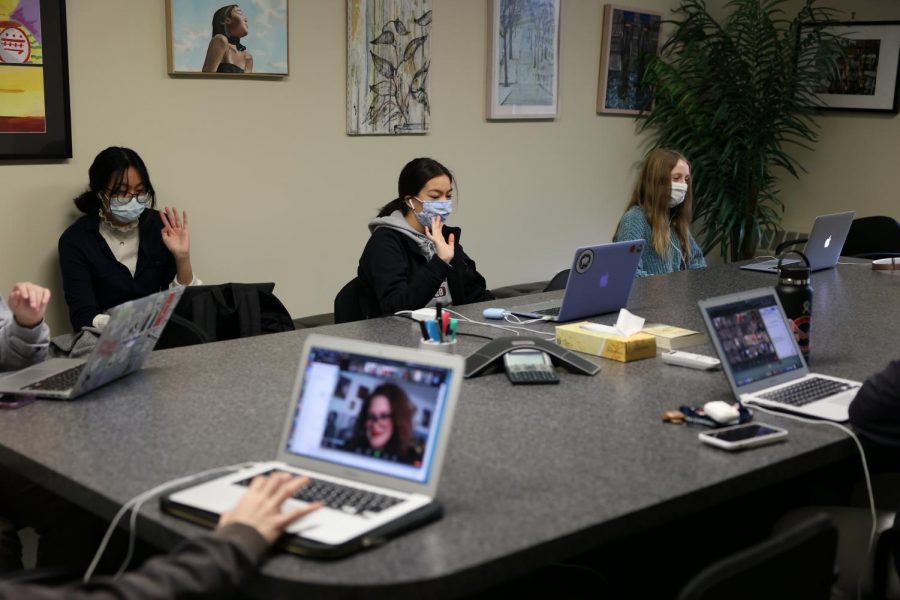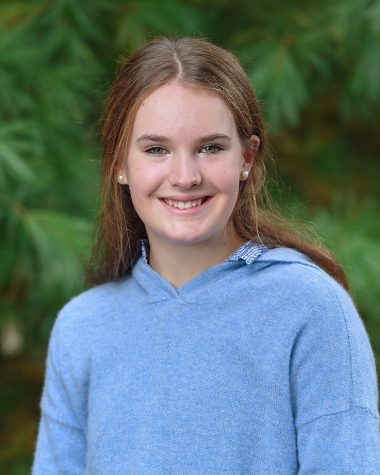J-Term 2021 Re-Envisioned
How St. Luke’s created a Covid-friendly J-Term 2021.
January 28, 2021
If you’re part of the St. Luke’s community, I’m sure you’ve heard about the famous ‘J-Term’ at one point or another. It is a group project focused on solving current world problems, such as racism and poverty. Each January, all ninth graders look forward to this one-of-a-kind experience to work on a weeklong project and present it in the J-Term Showcase. As a ninth grader, I had been looking forward to this experience for months. I’m sure you’re tired of hearing about things that were cancelled due to Covid, but unlike other stories you may have seen, Covid couldn’t ruin this unique experience. Instead, I got to experience J-Term in a way that no other ninth graders had before.
I’m not going to lie; when I first received the email confirming that J-Term would be designed specifically for online learning, I wasn’t too psyched about spending the whole week on my computer. My initial thought was that I wouldn’t be able have the face-to-face experience that made J-Term so special. All the activities that groups had created on the gym floor, the flyers you could hand out to parents and classmates, and the chance to collect J-Term stickers–none of it would be possible this year. I thought it was just going to be another week of tiring online classes, but it was a whole new experience.
This year, St. Luke’s partnered with an organization called Close-Up, which is a nonprofit organization that offers programming to educate and encourage students to participate in civic affairs and government. The week consisted of a schedule designed by Close-Up specifically for virtual learning. Each morning, we began by meeting with our advisories and discussing questions from the J-Term advisory journal; we used our journal documents to respond to questions each night and then discuss our answers in advisory the next morning. One of the questions in the journal asked what our future would look like, and I thought this was an important question to discuss because it is important to talk about how we are going to make a positive change in the world. After advisory, we met in the main Close-Up room with the entire ninth grade and had a morning welcome along with some fun activities, such as trivia. In our groups, we had one Close-Up leader who explained certain aspects of the project and always began our workshop time with some motivating songs.
On the first day, we were split into main groups based on the topics we were interested in studying: children, racism, the environment, or poverty. Within these groups, we decided what the three subcommittees would be. I was a part of the racism committee, and we decided on the three sub-issues of criminal justice, health, and education. Generally, I spent the most time in my subcommittee working on our presentation and solution for racism in the healthcare system.
When my group first got together, I was unsure whether we would make a good team since we all had different personalities. However, by our last Zoom session we were all laughing and talking like we had been friends for years. Our group worked extremely well together, and I’m sure I can say the same for others. Even though our interactions were virtual, J-Term was still a great opportunity for new students to get to know other classmates and work together.
Now, you may be wondering what we worked on the entire week and what the showcase looked like. This year, the guidelines looked a little different, but trust me, it was just as much work! We began by researching and creating an outline of what we wanted to focus on. We then decided on a solution that was logical and had supporting research, as well as a plan of action. Some actions you could take were starting an organization or simply raising awareness. This also included a call to action, issue statement, and plan for carrying out actions. The showcase was a 5-minute presentation on our topic and solution that offered our audience action steps.
Not only did I learn a lot about the project itself, but J-Term also offered many educational opportunities, such as the chance to hear from guest speakers. One of the most fascinating experiences of J-Term for my group was listening to Celeste Trusty, a criminal justice advocate in Pennsylvania. Trusty shared meaningful stories about defendants on death row that she proved innocent; she also shared her opinion on matters related to racism in the criminal justice system. She helpfully referred us to organizations and people that were passionate about solving racial injustice, which was instrumental to finding scholarly information for our project, as well as to taking the next step in making a change.
Another powerful speaker was Omarina Cabrera, who is an advocate for educational equity and mentoring. Cabrera shared personal stories about her education in childhood and in college, and explained what it meant to be a leader in our community and how we could make an impact, even as teenagers. These speakers inspired me to continue to make a difference even after J-Term was over.
Although J-Term 2021 was designed in a completely different way than ever before, and it required long hours in front of our computers, it was a positive and beneficial experience. I wouldn’t hesitate to do it again. It was an exciting twist to the normal school week, and an opportunity to learn about and consider solutions to worldwide problems. Thank you to St. Luke’s and Close-Up for arranging this incredible week!




